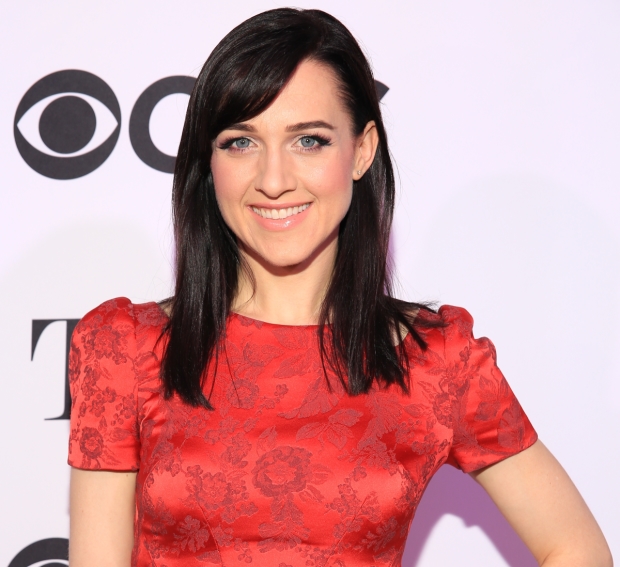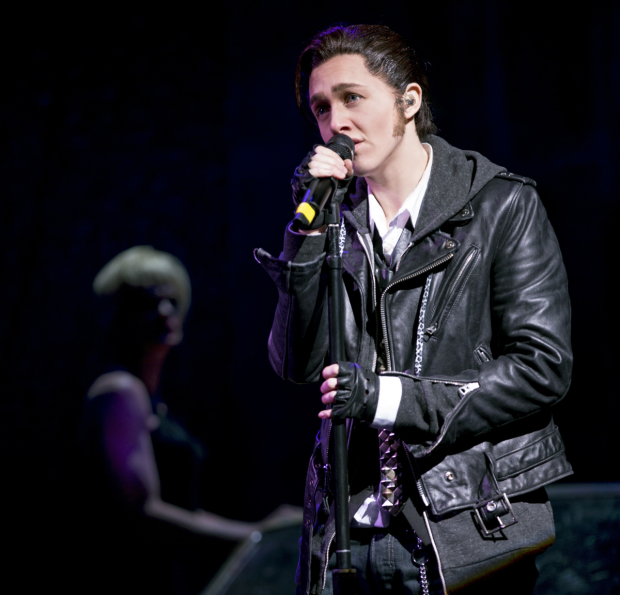Lena Hall Brings Polyamory to Lincoln Center
The Tony-winning ”Hedwig” veteran trades her male drag for someone more familiar in Sarah Ruhl’s ”How to Transcend a Happy Marriage”.
In 2014, Lena Hall won a Tony for her gender-bending performance as Yitzhak in the Broadway revival of the rock musical Hedwig and the Angry Inch. Even more memorable than her award-winning performance, however, was her acceptance speech , which ended with the My Little Pony aphorism, "Friendship is magic." In a strange way, that same sentiment captures the essence of Sarah Ruhl's new fantastical play, How to Transcend a Happy Marriage, opening tonight at Lincoln Center and giving Hall her first role ever in a nonmusical production.
Hall plays Pip, the linchpin of a polyamorous threesome who shakes up the lives of two traditional married couples (played by Marisa Tomei and Omar Metwally, and Robin Weigert and Brian Hutchison) when a dinner party takes a debauched turn. Pip has plenty of quirks, most notably her insistence on hunting for her own meat. But her free-minded philosophies draw something almost mystical out of her married disciples who have thus far narrowly defined the kinds of love that are available to them in their various relationships.
Hall took some time to share her own thoughts on Pip's worldview, much of which (polyamory aside) has resonated with her personally. After all, if we abide by Hall's calculations, expanding your circle of love and friendship can only make life more magical.

(© Tricia Baron)
This interview has been condensed and edited for clarity.
People know by now that you're well-versed in musicals, but is How to Transcend a Happy Marriage the first play you've done professionally?
Yeah, this is my very first play. It's so cool that my first play is a Sarah Ruhl play and directed by Rebecca Taichman. I mean, that's rad. And to top it all off it’s a Lincoln Center play. Boy, did I luck out.
Were you looking to do a play, or did this just find its way to you?
This just kind of came my way. I was actually in Hedwig at the time in L.A., so I just put myself on tape and had a phone conversation with Rebecca. It was just the right project for me. I love the character, I love the ideas that are being talked about, and I felt like it would be fun to play something that was a little bit more closely related to me instead of playing a dude or completely going outside of who I am. It’s more rooted in who I am — you know, except for the polyamory. [laughs]
Pip seems to lack all inhibitions and has a kind of spiritual wisdom to her. Is that a vibe you ever considered yourself to exude?
No, I never thought I exuded that at all. It's so funny — I think maybe because of how I was raised by my hippie parents. It's cool to play a character that is so rooted in her own spirituality because I'm kind of going through a spiritual journey myself at the moment. So it really reflects the things that I'm going through right now.
What kind of spiritual journey?
Just being more aware of sh*t — being more aware of something grander than myself. It's not one religion, it's not a definable God or anything like that. For me it's being able to let go and release control over everything in my life and allow myself to have some peace and quiet —which hasn't been a thing for me, and it's really hard to do in New York.
And in this career.
Yeah, because we're constantly looking for the next project. There's so much that is out of our hands and being able to release that into the world and focus on what I can do as a performer. I think I even talked about that in my Tony speech. The journey that I took to get to that moment — I would have never imagined that all these little tiny things would get me to winning that Tony Award, and it did. So have faith in yourself and in your actions and have faith in something grander that is taking care of you.

(© Joan Marcus)
Have you found any similarities between your own philosophies and Pip's?
I remember when I was reading the script, I thought, "Oh, I've said that before!" I love the philosophy she has about using every part of something — not being wasteful, because we've become this disposable society where everything is single use. That's kind of been my journey. I was living totally unconsciously. I was not being aware of what I was eating, I was not being aware of what I was putting in my body, I was just kind of in my own bubble. Once I started to flip the script and be more aware of the people around me, more connected to my food, more connected to where I get my clothes, more connected to what I use every day and what I throw out every day, I started to make these little changes in my life.
The play (and your polyamorous character in particular) brings a similar conscientious awareness to the ways people love one another. What kinds of conversations did you have about that in the rehearsal room?
We did a lot of research on polyamorous couples. We forget that love is not so one-person-based. There's something about physically being in a community of people that are relating to each other that is completely and utterly fulfilling. Romantic love is not all you're looking for. You're actually getting your fill of love from multiple sources. And a lot of people look — at least I looked to feel loved and completed by a romantic partner only, and that can be very limiting. If you open up your bubble to include other people — and I'm not talking about sexually, I'm just talking about emotionally connecting to people —then you're not flying in the dark. No one has to be alone. There is a community out there for anyone and everyone if they want it. There's this focus on the sex aspect of polyamory because that's what everyone is more curious about. But I feel like the polyamorous movement is not all about sex. It's about having a bigger sense of family — a bigger sense of home.

(© Kyle Froman Photography)








